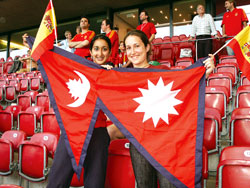 Downtown Munich, three minutes from our hotel, is bright yellow. Swarms of Portuguese-speaking yellow merge and cross waves of laughing English-speaking yellow. Inflated kangaroos squat on people's shoulders, watching live performances in the middle of a sidewalk. Impromptu shows play out next to fruit stalls and fountains: a breathtaking display of capoeira, a crowd singing Waltzing Matilda, drums, samba and songs in a very different accent.
Downtown Munich, three minutes from our hotel, is bright yellow. Swarms of Portuguese-speaking yellow merge and cross waves of laughing English-speaking yellow. Inflated kangaroos squat on people's shoulders, watching live performances in the middle of a sidewalk. Impromptu shows play out next to fruit stalls and fountains: a breathtaking display of capoeira, a crowd singing Waltzing Matilda, drums, samba and songs in a very different accent.
Everywhere you go there are Aussies and Brazilians talking and teasing each other. At one point, a Sele??o supporter turns to an Aussie: "You're going to lose 3-nil!" he says. The other guy in yellow just shakes his head and goes, "I know." Both laugh, and finish their drinks.
Another day, another city, another colour: this time, it's an invasion of the reds. Stuttgart is the scene of the Spain-Tunisia game. Coming out to the main street from the train station into the sunlight, the noise overwhelms. Nearly everyone is sporting a Spain jersey.
Tunisia loses and even though I was cheering for Spain (who executed a brilliant turnaround once Raul came on after half-time), it's a sad loss considering their first half performance. The train station is filled with dancing Spaniards and sulking Tunisians.
C?te d'Ivoire was my favourite team going into the competition, Serbia-Montengro 'my team' eight years ago and both squads had much hype surrounding them. But neither had any chance of making the next round, with their losses to Argentina and the Netherlands. C?te d'Ivoire, fractured by civil war, enjoyed a ceasefire during the World Cup. As Didier Drogba, striker and national icon, said, "The team is what Ivory Coast once was and should be. We have players who have different religions and come from different tribes on the team. We have a lot of fun. We want to win together. That's our message."
As I lined up to go into the stadium, I struck up a conversation with a group next to me. "Where are you from?" one tall German asked me.
"I'm Nepali," I replied.
"From Napoli?"
"No, Nepal." I prepared to launch into an explanation but there was no need.
"Wow," the man's friends responded, in genuine amazement. A camera appeared overhead.
"We've never seen a Nepali before."
Sitting there with my flag, I imagined being amongst a group of Nepali fans, cheering for our team. Would we be like the South Koreans, relentless in our support of the team, screaming throughout the game, just as loudly when we were up 2-0 as down 2-0? I am sure that we would not be of the booing type, unsporting, derisive of every move made by the opposing team, condemning every call the ref makes against ours. Would we be a tiny, enthusiastic group, like the Ivorians, outnumbered by our non-native supporters and perhaps even by our opponents' fans but adamant in making our presence heard? Nepal didn't make the finals but like the Irish and South African flags the Nepali double triangle also deserved to be there.
The power of football extends far beyond the field or the stands. Like a fine, invisible dust it moves through the air, settling on those it encounters. The world loves this tournament. There is the quality of football, inevitable when the most elite players are gathered together on a field: 24 or 25 uninterrupted passes culminating in a spectacular goal, a team effort. The power and grace of a midfielder as he sprints across the field, weaving through the defence, the superhuman strength with which a goalie leaps into the air.
I savour the sense of unity, the camaraderie, the energy. Munich as I know it is one big party, where you know you will have something in common with the person next to you. As I watch a game live, it strikes me that people the world over are viewing this exact spectacle. There are individuals cheering for Ghana in Germany and Nepal. Also in New Delhi, in Namibia, in Norway.
When you hold your breath before a penalty, there are millions who hold their breaths with you, who utter a collective gasp and cheer. Though you can't hear them, they are there. Perhaps the best thing about being in Germany was this: watching and jumping and shouting with silent fans from all over the world.


